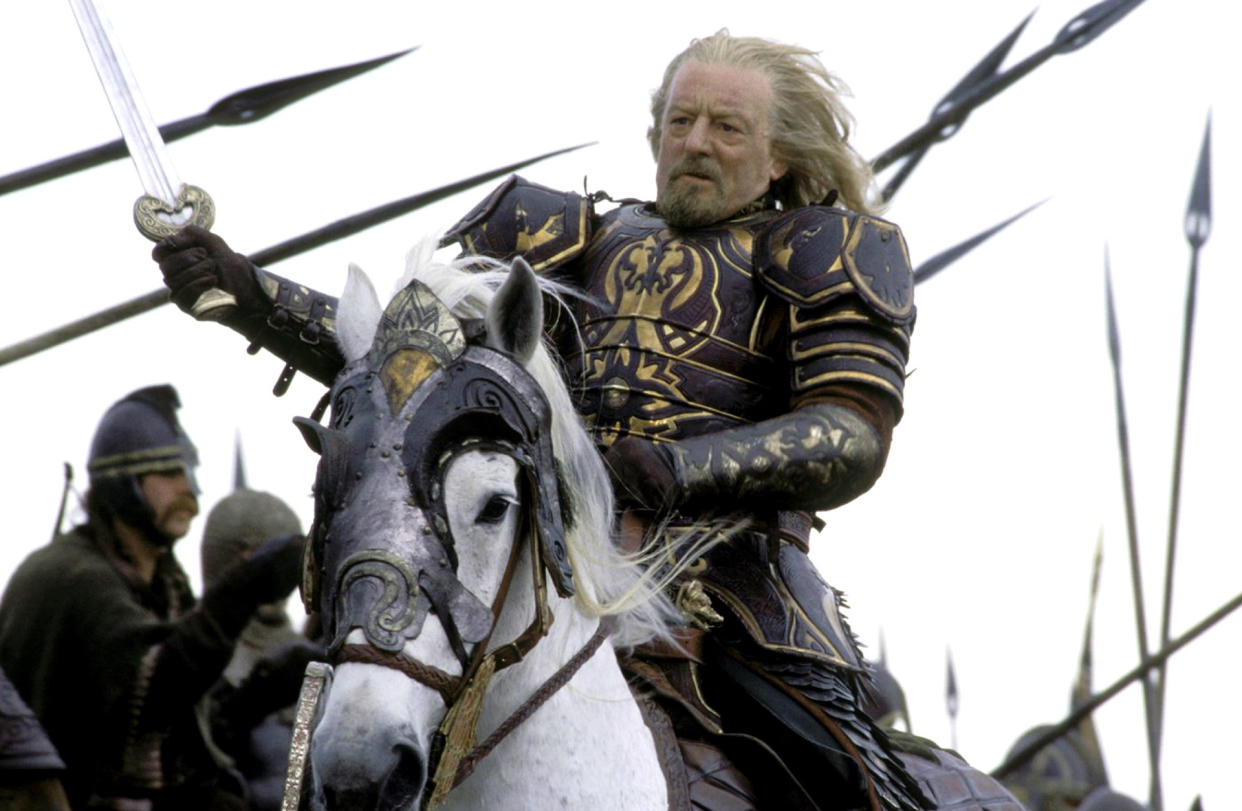The Late Bernard Hill Was the Emotional Heart of the ‘Lord of the Rings’ Movies

There’s a special tug at the heartstrings that follows the death of an actor who’s been closely associated with a death scene, as is the case with Bernard Hill, who died May 5 at the age of 79.
The death of Juanita Moore in 2013 at the age of 98 came 54 years after maybe the ultimate movie deathbed scene — not to mention funeral, with a horse-drawn hearse and Mahalia Jackson eulogizing her in song — in Douglas Sirk’s “Imitation of Life.” And when Carl Weathers died earlier this year, it came nearly four decades after his best-known character, Apollo Creed, had died in “Rocky IV,” prompting the entire “Creed” franchise to spring up in his wake, with him conspicuously, obviously, absent.
More from IndieWire
'Firebrand' Trailer: Alicia Vikander Tries to Outmaneuver Jude Law's Paranoid King Henry VIII
Russo Brothers Studio AGBO Is Going All-In on Tech with New Innovation Department
Much praise and remembrance has been given since Hill’s passing to his role as Captain E.J. Smith in James Cameron’s “Titanic.” But Bernard Hill’s death scene as Theoden King in “The Lord of the Rings: The Return of the King” has imprinted itself on anyone with even a fleeting interest in 21st-century blockbuster filmmaking. A counterpoint of heartbreak amid triumph, his hushed utterance to beloved niece Eowyn, “I go to my fathers, in whose mighty company I shall not now feel ashamed,” is one of the great guy-cry moments of all time.
It’s symbolic of the work he did throughout his two films of the trilogy, “The Two Towers” and “The Return of the King.” Work that arguably grounded these movies in humanity more than any of his co-stars. Just that parting line alone conveys both Valhalla-like grandeur and a bracing intimacy: Unhorsed in battle, his body broken, he spends his final breaths in a moment of connection with his niece. In Hill’s hands, you get a sense that gazing into the eyes of a loved one is absolutely the thing Theoden would most want to do in his last moments on this earth.
Sprawling spectacle and deep feeling: Peter Jackson combined both to legendary effect in his Tolkien adaptations. And Hill embodied them. The first time we see him as Theoden, he’s at the center of one of the most spectacular visual effects moments in the entire trilogy, when, having been rendered especially wizened and bent by dark forces at work, he’s suddenly youthened by the wizard Gandalf. The makeup work, time-lapse editing, and CGI combined in this moment wouldn’t have been nearly as powerful without Hill’s own shifting posture and ever-more-alert glances. He made a miracle seem truly possible.
If Tolkien’s meta-narrative in “The Lord of the Rings” is about how humanity came to inherit the earth over all the magical people who once resided here as well, Hill’s task as Theoden was to represent who everyone else is fighting for. There’s Viggo Mortensen’s Aragorn, with one foot in the magical world of the elves and the other in humanity, but Theoden is all human. His Viking-like people, horse lords known as the Rohirrim, are noble warriors, to be sure… but we also see them as refugees, as victims of war. “The Lord of the Rings” isn’t just about ending wars to preserve the garden-like perfection of The Shire; it’s about making sure everyone has a chance to live. To “breathe the free air again,” as Gandalf tells Theoden after he literally took decades off his face.
There’s a natural quality to the Rohirrim that defies the sometimes twee cutesiness of the hobbits or the magical unearthliness of the elves. They’re the people who truly bring human stakes to the table. Which is why when Theoden does go over the top, and Hill intones great battle cries like, “Now for wrath, now for ruin, and a red dawn! Forth Eorlingas!” it feels rooted in a real place. He’s not just quotable; he’s believable. We’ve seen Theoden crying over the death of his son, dreamily staring off into space, wondering, Arthur-like, “How did it come to this?” and cockily thinking that his people would be unreachable to their enemies in his fortress. By the time he says something with as much geek grandeur as “the horn of Helm Hammerhand shall sound in the Deep one last time!” you just go with it.
Tom Hoeler, the senior editor of Random House Worlds (the publishing imprint that reissues all the new editions of “The Lord of the Rings” in the U.S.), noted in his own tribute how “a beautiful thing about Bernard Hill and his Theoden portrayal is, that easily could be a ‘stiff upper lip, no emotion’ leader we so often see, saving a sole emotional beat for his last scene with Eowyn as a ‘oh he always *did* care’ moment. Yet the story/Hill don’t do that. The story constantly throws moments of emotional vulnerability at him. And Hill embraces those, playing those with as much vigor, honesty, and commitment as he does the grand speeches/battle cries.”
Before the climactic final battle in “The Return of the King,” Theoden tells Eowyn that the one thing he wishes for her is to see her smile again. It’s warmth personified, Hill’s voice somewhere between a whisper and a purr, and totally defying any archetypal notion of a warrior king even for a saga that’s all about archetypes. To be archetypal is one thing. To be singular, like Hill, is another.
Best of IndieWire
The 13 Best Thrillers Streaming on Netflix in May, from 'Fair Play' to 'Emily the Criminal'
The Best Father and Son Films: 'The Tree of Life,' 'The Lion King,' and More
The 10 Best Teen Rebellion Films: 'Pump Up the Volume,' 'Heathers,' and More
Sign up for Indiewire's Newsletter. For the latest news, follow us on Facebook, Twitter, and Instagram.


